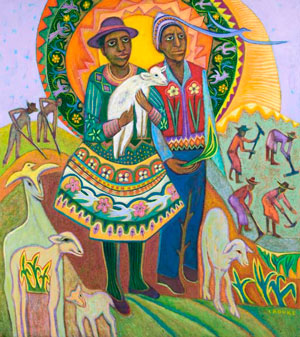Can you give me an overview of the Nourishing Traditions diet – what are the basic guidelines? Thank you!
Sally’s response:
The dietary guidelines of the Weston A. Price Foundation are:
• Eat whole, natural foods.
• Eat only foods that will spoil, but eat them before they do.
• Eat naturally-raised meat including fish, seafood, poultry, beef, lamb, game, organ meats and eggs.
• Eat whole, naturally-produced milk products from pasture-fed cows, preferably raw and/or fermented, such as whole yogurt, cultured butter, whole cheeses and fresh and sour cream.
• Use only traditional fats and oils including butter and other animal fats, extra virgin olive oil, expeller expressed sesame and flax oil and the tropical oils—coconut and palm.
• Eat fresh fruits and vegetables, preferably organic, in salads and soups, or lightly steamed.
• Use whole grains and nuts that have been prepared by soaking, sprouting or sour leavening to neutralize phytic acid and other anti-nutrients.
• Include enzyme-enhanced lacto-fermented vegetables, fruits, beverages and condiments in your diet on a regular basis
• Prepare homemade meat stocks from the bones of chicken, beef, lamb or fish and use liberally in soups and sauces.
• Use herb teas and coffee substitutes in moderation.
• Use filtered water for cooking and drinking.
• Use unrefined Celtic seasalt and a variety of herbs and spices for food interest and appetite stimulation.
• Make your own salad dressing using raw vinegar, extra virgin olive oil and expeller expressed flax oil.
• Use natural sweeteners in moderation, such as raw honey, maple syrup, dehydrated cane sugar juice and stevia powder.
• Use only unpasteurized wine or beer in strict moderation with meals.
• Cook only in stainless steel, cast iron, glass or good quality enamel.
• Use only natural supplements.
• Get plenty of sleep, exercise and natural light.
• Think positive thoughts and minimize stress.
• Practice forgiveness
photo: Peru: Tree of Life ©Betty LaDuke | Artist Betty LaDuke works with Heifer International to end world hunger by offering families in need long term solutions that work. One of the cornerstones of Heifer’s approach is “Passing on the Gift”, a cycle of sustainability where people share the offspring of their animals along with their knowledge, resources, and skills to create a circle of self-reliance that reaches around the globe.










0 Comments
Trackbacks/Pingbacks